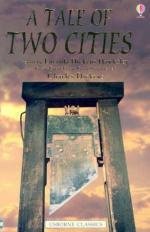|
|
A Tale of Two Cities Book 3, Chapter 9
After a moment, Carton emerges from the room and tells Mr. Lorry that not much has come of their arrangement; he has gained access to Darnay, but that is all. Mr. Lorry says that this will never save Charles. Carton agrees sadly and tells Mr. Lorry that he is a dear friend to him and that he would not respect Mr. Lorry's sorrow more if he were Carton's father. Mr. Lorry is touched and clasps Carton's hand. Carton tells Mr. Lorry not to communicate Carton's presence to Lucie, as he does not want to get her hopes up that he could do something for her. Carton asks how Lucie is; Mr. Lorry tells him that she is anxious and unhappy but still very beautiful. Carton heaves a long, wistful sigh. After a while, Carton walks Mr. Lorry to the Manette's apartment, and when Mr. Lorry goes up, Carton stands in the courtyard for awhile, gazing up at Lucie's window. He walks toward the prison at La Force, thinking to himself that he is tracing Lucie's steps, as she used to walk there daily.
Outside the prison, he sees the woodcutter. They strike up a conversation, in which the depraved woodcutter exclaims happily that there were sixty-three executions that day, and that they were committed in less time than it took him to smoke two pipes of tobacco. Carton chats with him amiably but is secretly revolted. After awhile, he stops at a chemist's shop and purchases some packets of powder. Still restless, he continues walking throughout the night, all the while thinking of a phrase that was read at his father's grave: "I am the resurrection and the life, saith the Lord: he that believeth in me, though he were dead, yet shall he live: and whosoever liveth and believeth in me, shall never die." Book 3, Chapter 9, pg. 311 The phrase comes to him over and over during his walk. After sunrise, he goes to the Conciergerie, where Charles' trial is about to take place. He sees Lucie, Dr. Manette, and Mr. Lorry, but he hides in the back. All eyes in the courtroom are on the jury, which includes a bloodthirsty-looking Jacques Three. A member of the jury reads the details of Darnay's case and announces that Darnay has been openly denounced by three people--Ernest Defarge, his wife Thérèse, and Dr. Alexandre Manette. At the reading of Dr. Manette's name, the court erupts into an uproar, and Dr. Manette leaps to his feet, exclaiming that this denunciation is a fraud and demanding to know who would accuse him of denouncing his own son-in-law. The court calls Defarge to testify; Defarge says that when he cared for Dr. Manette after he was freed, the doctor did not know his own name and that he only knew himself by the name One Hundred Five, North Tower, where he had been imprisoned. Defarge says that he vowed to search out this cell when the Bastille fell, and he did so on the very day it did. There, he said, he found a paper in a hole in the chimney of the cell that Dr. Manette had written while he was a prisoner. He gives the paper to the President, who says that it must be read aloud.




